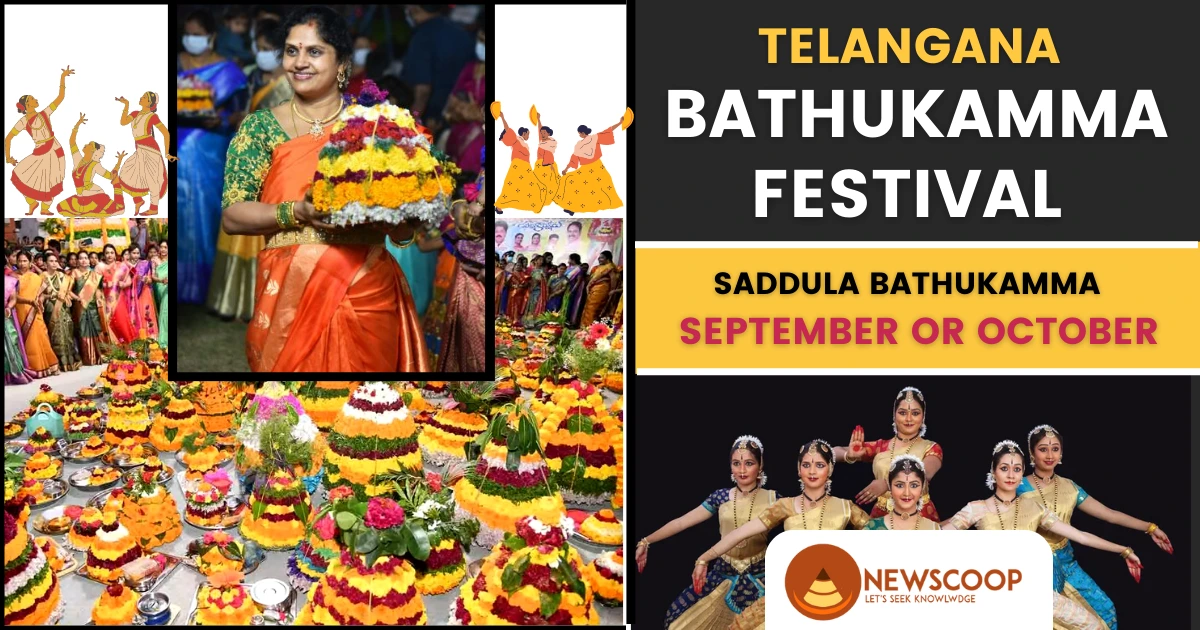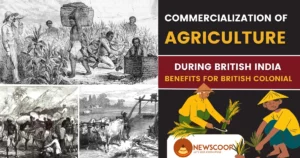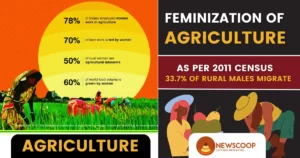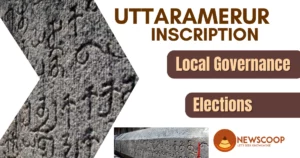The Bathukamma festival holds a significant place in the cultural fabric of Telangana, India. It is a floral festival celebrated with great enthusiasm and zeal by the people of the region. This article explores the historical and cultural significance of Bathukamma and its relevance to the UPSC (Union Public Service Commission) examination.
Bathukamma Festival
The Bathukamma festival is a vibrant floral extravaganza celebrated primarily in Telangana and certain parts of Andhra Pradesh. Spanning nine days, this annual festival begins with Mahalaya Amavasya and culminates with Durgashtami, usually occurring in September-October.
Some Factual Points:
- Bathukamma is a vibrant and colorful festival celebrated by women in the Indian state of Telangana.
- The festival typically takes place in the latter half of the monsoon season, usually in September or October.
- It is a celebration of nature’s beauty, with women creating floral arrangements using various types of flowers that bloom during this season.
- The most common flowers used in Bathukamma are Gunuka Poolu, Tangedu Poolu, Banti, Chemanti, and Nandi-Vardhanam.
- The festival lasts for a week and culminates in the grand finale known as “Saddula Bathukamma,” which falls two days before the festival of Dussehra.
- Women actively participate in the festivities, wearing colorful traditional attire and adorning themselves with jewelry and decorations.
- During Bathukamma, women create miniature versions of Bathukamma and play with them every evening before immersing them in water.
- On the final day of the festival, men collect flowers like Gunuka and Tangedi from untamed plains to prepare the grand Bathukamma.
- Bathukamma honors the natural bond between land, water, and humans, symbolizing the interconnectedness of these elements.
- The festival also includes the ritual of building ‘Boddemma,’ a goddess Gowri idol made from mud, which is immersed in water along with Bathukamma.
- Women form a large circle around the Bathukamma installation, singing traditional songs and expressing their unity, love, and sisterhood.
When Bathukamma Festival is Celebrated?
Bathukamma is celebrated during the latter half of the monsoon season in the Indian state of Telangana. It typically falls in the months of September and October, just before the arrival of winter. The festival begins a week before the grand finale known as “Saddula Bathukamma,” which occurs two days before the festival of Dussehra. The exact dates may vary each year based on the lunar calendar.
Women’s Festival
Bathukamma is primarily a women’s festival, where they come together to celebrate the beauty of nature and express their joy through vibrant rituals. Telangana’s women proudly proclaim the cultural character of the region as they immerse themselves in the festivities.
To embrace the colors of Bathukamma to the fullest, women typically return to their parents’ homes from their in-laws. It is a time for them to bask in the freshness of freedom and fully immerse themselves in the vibrant atmosphere of the festival.
During Bathukamma, women create miniature versions of Bathukamma and play with them every evening. These intricately crafted floral arrangements are treated with love and care. On the final day of the festival, these mini Bathukammas are joyfully immersed in a local water pond, symbolizing the merging of nature’s beauty.
In the week preceding Bathukamma, women create ‘Boddemma,’ a representation of the goddess Gowri (mother Durga), using earthy mud. This idol is immersed in the water pond along with Bathukamma, symbolizing the cyclical nature of life and the divine presence in all aspects of the festival.
During Bathukamma, women adorn themselves in their finest attire, showcasing a vivid palette of colors. They take great care in selecting traditional outfits and embellish them with exquisite jewelry and accessories. The vibrant clothing and decorations reflect the joy and festive spirit of the occasion.
Circle of Togetherness
A significant aspect of Bathukamma is the formation of a large circle by women from the neighborhood. They gather around the Bathukamma installation in the courtyard, forming a magnificent human circle of togetherness, love, and sisterhood.
They sing traditional songs known as Bathukamma songs, passed down through generations, as they gracefully move in a circular pattern. This circle represents unity, solidarity, and the power of collective celebration.
Through rituals, songs, and heartfelt expressions of joy, Bathukamma brings communities together and uplifts the spirits of all who participate. It is a festival that not only celebrates the traditions of Telangana but also highlights the importance of preserving and cherishing the natural world around us.

Days of Bathukamma Festival
The following are the names of each day of Bathukamma and the corresponding Naivedyam offered:
- Engili pula Bathukamma
- Atkula Bathukamma
- Bathukamma Muddapappu
- Nanabiyyam Bathukamma
- Atla Bathukamma
- Aligina Bathukamma
- Vepakayala Bathukamma
- Venna Muddala Bathukamma
- Saddula Bathukamma
| Day | Name | Explanation |
|---|---|---|
| Day 1 | Engili pula Bathukamma | The celebration begins on Mahalaya Amavasya, also known as Pethara Amavasya in Telangana. It marks the start of the Bathukamma festival. |
| Day 2 | Atkula Bathukamma | On this day, special offerings are made using flattened parboiled rice, bland cooked lentils, and jaggery. |
| Day 3 | Bathukamma Muddapappu | The focus is on offering softened boiling lentils, milk, and jaggery as part of the rituals. |
| Day 4 | Nanabiyyam Bathukamma | Rice is offered as Naivedyam (food offering) on this day. |
| Day 5 | Atla Bathukamma | Rice flour dosas (Atlu) are prepared and offered to the deities as part of the festive customs. |
| Day 6 | Aligina Bathukamma | Steamed rice flour balls (Vundrallu) are offered during the rituals of this day. |
| Day 7 | Vepakayala Bathukamma | Neem flowers are used in the Naivedyam (food offering) on this day. |
| Day 8 | Venna Muddala Bathukamma | Sweetened butter (Venna Muddalu) is offered as part of the rituals of this day. |
| Day 9 | Saddula Bathukamma | The grand finale of the Bathukamma festival. Elaborate Naivedyam including tamarind rice, sweet rice dish, and more are prepared. |
Each of these days of Bathukamma is associated with specific rituals, prayers, and unique food offerings, adding to the richness and significance of the festival.
Men’s Role in Bathukamma Festival
- Men play an important role in the Bathukamma festival in Telangana.
- They are responsible for collecting flowers that are used to prepare the grand Bathukamma.
- Men venture into the untamed plains to gather flowers such as Gunuka and Tangedi.
- They carry bagfuls of these flowers back home for the festival.
- Men actively participate in the preparation of the Bathukamma alongside women.
- They assist in arranging the flowers and creating the magnificent structure.
- The entire household, including men, gathers together to contribute to the festival preparations.
- Men also support and participate in other rituals and festivities during Bathukamma.
- Their involvement signifies the collective effort and unity in celebrating the festival.
- The festival of Bathukamma highlights the inclusive nature of the celebration, involving both men and women in different roles.
Conclusion
Bathukamma is a remarkable festival that showcases the cultural richness of Telangana and celebrates the beauty of nature through the blooming of vibrant flowers.
The rituals, customs, and Naivedyams associated with Bathukamma bring together communities, foster unity, and create a joyous atmosphere of togetherness and sisterhood. This festival serves as a testament to the deep-rooted connection between humans, land, and water, reminding us of the importance of preserving and honoring our natural surroundings.
Thank You!





